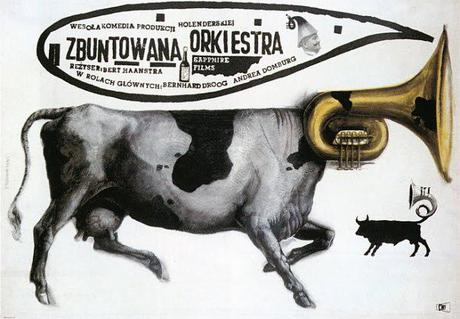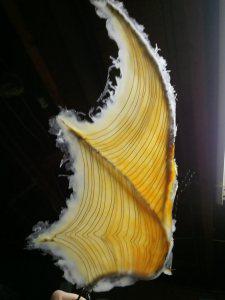
Franciszek Starowieyski, Zbuntorkiestra, 1960
I am all things strange and bold. —Benjamin Britten, The Turn of the Screw
The wintry Moscow days of Milos Krasic—eight consecutive settings of Lobanovskyi’s textbook tactics with lyrics by Nikolai Leskov—were completed sometime in 2010, before Prokofiev and Britten’s The Turn of the Screw were scheduled for performance at the St. Petersburg Festival and between the Serbian’s apprenticeship at CSKA and his move to Juventus. They are not described as a song-cycle, merely as ‘lyrics and ballads for winger’, but Krasic’s insight into melancholy fatalism and naive imagery gives an overall unity to one of his most satisfying works for right foot and side-line. Gone is the florid ornamentation suitable to a Garrincha; in its place is an economical, epigrammatic austerity.
 Krasic’s use of sturm-und-drang runs as a launching-point for the philosophical is well matched by Juventus’ ability to invent a simple imitative figure which achieves deeper tactical significance. In musical terms, for instance, a C minor triads would depict the engine-whistle that Krasic gives out when he sets himself in motion, like a Union Pacific cart launching at full speed into the Great West; the strictures of violin cadenzas magically suggest the “life so free” for which Milos the winger wistfully yearns. Similarly, the ‘creak, creak’ sounds that echo when he runs behind a full-back are elements of the musical structure in addition to illustration—proud bird-songs, the flutterings of a Balkan wagtail. Neither the sound of these passages nor its use here is specifically oriental, but the challenge of finding new sound-symbols to match his chosen text evidently derived to Krasic from the spare style and bitter-sweet unrest of the Black Sea. Like an old lute in one of the few Gustav Mahler’s Chinese-inspired Lieder, Krasic asks for ‘remoteness’ and obtains it by strictly circumscribing his work within variants of a right-foot chord-progression. The winger’s ability to draw from an instrument even more than a virtuoso performer imagined possible was never more strongly displayed than against Lazio and Cagliari in the fall of 2010, when his breakneck runs proved capable of suggesting complex harmonic texture out of single notes sound. Like the plodding, climactic arpeggio of a guitar, Krasic has remained immeasurably self-sufficient in every phase of his development. Only a coach of rare technical skill combined with even rarer interpretative intelligence can hope to penetrate the subtle secrets of a player who shifts between devastating primitivism and desperate depression. ♦
Krasic’s use of sturm-und-drang runs as a launching-point for the philosophical is well matched by Juventus’ ability to invent a simple imitative figure which achieves deeper tactical significance. In musical terms, for instance, a C minor triads would depict the engine-whistle that Krasic gives out when he sets himself in motion, like a Union Pacific cart launching at full speed into the Great West; the strictures of violin cadenzas magically suggest the “life so free” for which Milos the winger wistfully yearns. Similarly, the ‘creak, creak’ sounds that echo when he runs behind a full-back are elements of the musical structure in addition to illustration—proud bird-songs, the flutterings of a Balkan wagtail. Neither the sound of these passages nor its use here is specifically oriental, but the challenge of finding new sound-symbols to match his chosen text evidently derived to Krasic from the spare style and bitter-sweet unrest of the Black Sea. Like an old lute in one of the few Gustav Mahler’s Chinese-inspired Lieder, Krasic asks for ‘remoteness’ and obtains it by strictly circumscribing his work within variants of a right-foot chord-progression. The winger’s ability to draw from an instrument even more than a virtuoso performer imagined possible was never more strongly displayed than against Lazio and Cagliari in the fall of 2010, when his breakneck runs proved capable of suggesting complex harmonic texture out of single notes sound. Like the plodding, climactic arpeggio of a guitar, Krasic has remained immeasurably self-sufficient in every phase of his development. Only a coach of rare technical skill combined with even rarer interpretative intelligence can hope to penetrate the subtle secrets of a player who shifts between devastating primitivism and desperate depression. ♦

